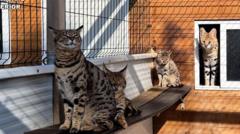The arrest is part of a larger investigation into a global trafficking network that exploits social media to market endangered wildlife.
**Couple Detained for Illegal Breeding of Rare Cats in Spain**

**Couple Detained for Illegal Breeding of Rare Cats in Spain**
Spanish authorities apprehend a couple involved in the illegal breeding and sale of exotic cats, including protected species.
In a significant crackdown on wildlife trafficking, Spanish authorities have detained a couple accused of breeding and selling exotic cats, including protected species like white tigers, pumas, and clouded leopards, through online platforms. The operation took place on the Spanish island of Majorca, where the Civil Guard police executed a search warrant at the couple's residence, uncovering 19 rare feline species on the premises.
The discovered animals included a caracal, two servals, and 16 hybrid felines. Authorities indicate that this incident is merely a fraction of a much larger global scheme involving various stakeholders such as breeders, transporters, and veterinarians. "Most of the animals advertised for sale were sourced from countries like Russia, Belarus, and Ukraine, being smuggled into the European Union," stated a representative from the Civil Guard.
The couple's online presence appeared to be quite active, attracting interest from would-be purchasers across different nations. According to reports, the cats were trafficked into the EU via Poland's border with Belarus and circulated using falsified documentation.
The International Fund for Animal Welfare (IFAW) has expressed concern over Europe becoming a focal point for the illegal exotic wildlife trade, which has seen a troubling increase. Additionally, the couple used social media to promote other exotic animals, including hyenas and desert lynxes.
One striking case involved a clouded leopard—native to the Himalayas—with a hefty asking price of €60,000 (£52,000; $68,000). This raid was part of a larger operation launched in March, and authorities are also investigating another individual for selling diverse species of exotic animals online.
The rescued felines are currently being housed at the Son Servera Safari Zoo in Majorca and will subsequently be relocated to a rescue facility near Alicante. The high demand for these exotic cats, often perceived as symbols of wealth or status, has been fueled by social media, according to IFAW. Nonetheless, these felines, which require ample space and exhibit aggressive behavior, can pose significant risks to both humans and other animals. The Spanish Civil Guard highlighted the challenge many individuals face when attempting to care for such exotic pets, often leading to abandonment.
The discovered animals included a caracal, two servals, and 16 hybrid felines. Authorities indicate that this incident is merely a fraction of a much larger global scheme involving various stakeholders such as breeders, transporters, and veterinarians. "Most of the animals advertised for sale were sourced from countries like Russia, Belarus, and Ukraine, being smuggled into the European Union," stated a representative from the Civil Guard.
The couple's online presence appeared to be quite active, attracting interest from would-be purchasers across different nations. According to reports, the cats were trafficked into the EU via Poland's border with Belarus and circulated using falsified documentation.
The International Fund for Animal Welfare (IFAW) has expressed concern over Europe becoming a focal point for the illegal exotic wildlife trade, which has seen a troubling increase. Additionally, the couple used social media to promote other exotic animals, including hyenas and desert lynxes.
One striking case involved a clouded leopard—native to the Himalayas—with a hefty asking price of €60,000 (£52,000; $68,000). This raid was part of a larger operation launched in March, and authorities are also investigating another individual for selling diverse species of exotic animals online.
The rescued felines are currently being housed at the Son Servera Safari Zoo in Majorca and will subsequently be relocated to a rescue facility near Alicante. The high demand for these exotic cats, often perceived as symbols of wealth or status, has been fueled by social media, according to IFAW. Nonetheless, these felines, which require ample space and exhibit aggressive behavior, can pose significant risks to both humans and other animals. The Spanish Civil Guard highlighted the challenge many individuals face when attempting to care for such exotic pets, often leading to abandonment.


















